A Special Needs Trust (SNT) is a legal arrangement created to benefit an individual with a disability. The primary purpose of this trust is to supplement — not replace — government assistance programs, allowing the beneficiary to maintain eligibility for public benefits while receiving additional financial support from the trust.
There are three main types of Special Needs Trusts:
First-Party SNT: This trust is funded with the beneficiary’s own assets, such as a personal injury settlement or inheritance. It can be established by the individual with the disability, a parent, grandparent, legal guardian, or court. Upon the beneficiary’s death, any remaining funds in the trust must first be used to reimburse Medicaid for benefits provided during their lifetime.
Third-Party SNT: This trust is funded by someone other than the beneficiary, typically family members or friends. This type of trust does not require Medicaid repayment upon the beneficiary’s death, making it a popular choice for parents who wish to leave assets to a child with special needs.
Pooled Trust: This trust is managed by a non-profit organization that pools funds from multiple beneficiaries, each with their own individual account. This arrangement helps reduce administrative costs while still providing tailored support to each beneficiary.
Administering a Special Needs Trust comes with unique challenges, particularly when it comes to ensuring that the trust funds are used in a way that doesn’t jeopardize the beneficiary’s eligibility for government benefits. At LCNB I Wealth, we are equipped to serve as trustee for both First-Party and Third-Party SNTs. Our best practices include:
Careful Distribution Planning: We carefully evaluate each distribution to confirm it will not impact the beneficiary’s government benefits.
Coordination with Government Benefits: Our team stays well-versed in the specific requirements of public assistance programs that our beneficiaries may rely on. This includes, but is not limited to, Medicaid, Social Security benefits, and housing subsidies.
Regular Review and Adjustment: We regularly assess the beneficiary’s care plan and financial needs so the trust continues to meet their evolving needs.
Communication with the Beneficiary: We place a high priority on maintaining open communication with the beneficiary to fully understand their situation, needs and preferences.
Ongoing Legal Review: Given the changing landscape of laws and regulations surrounding SNTs, we consult with disability law experts regularly to guarantee compliance with current legal standards.
The increased risk of mismanaging distributions and inadvertently affecting eligibility for benefits is one of the key reasons a corporate trustee is often recommended for SNTs. At LCNB I Wealth, we are always ready to assist with the administration of Special Needs Trusts or any other estate planning needs you may have.






